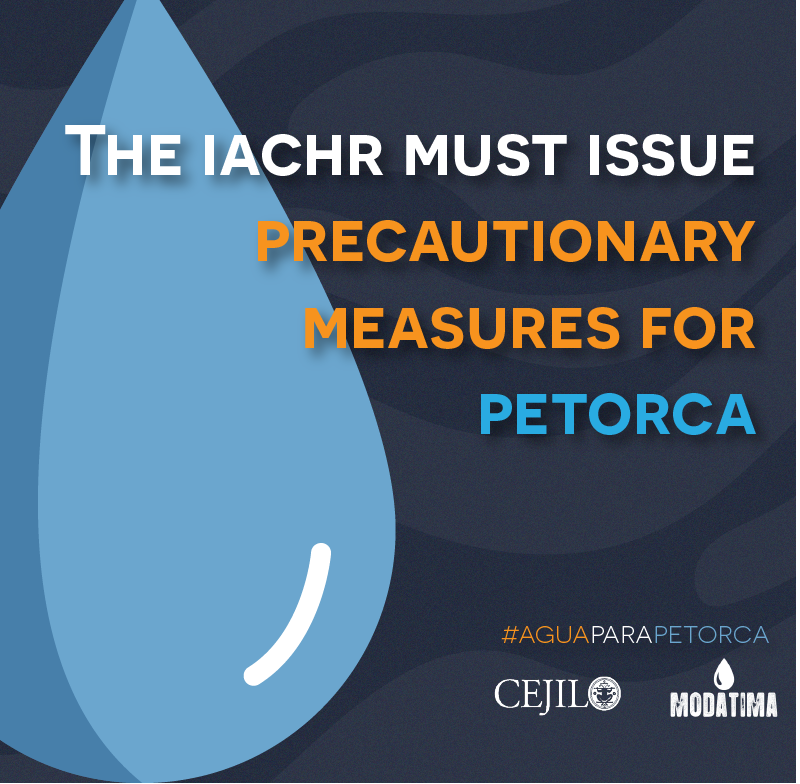






Buenos Aires, Argentina and Santiago de Chile, May 14, 2020.- The Center for Justice and International Law (CEJIL) and the Movement in Defence of Water, Land and the Environment (MODATIMA) requested today that the Inter-American Commission on Human Rights (IACHR) implement prevention methods to help manage the emergency befalling the rural communities of the communes of La Ligua, Petorca and Cabildo in the province of Petorca in the Valparaíso region of Chile. These communities are adversely impacted by the lack of access to water, which puts their lives and health at great risk and impedes them from implementing hygiene methods to prevent the spread of COVID-19.
The communes where these communities are located have been declared catastrophe zones and regions of water scarcity since 2008. There is little rainfall in these regions, causing rivers and wells to dry up and underwater aquifers to be depleted. The natural water sources that remain aren’t accessible to the rural farming population since they are located on private property controlled by the agricultural industry and mining companies in the area. These companies continue exploiting the region even during the worst drought that the region has ever faced. As a result, the communities have been surviving off of an emergency water supply that allows them to have 50 liters of water per person per day. This water is of questionable quality and is mostly supplied through trucks carrying water tanks. It’s been shown that in practice, these communities often receive much less than this minimal amount of water.
Fifty liters of water a day is equivalent to the quantity used during a four minute shower. This is half the amount of 100 liters a day that international standards have established as the bare minimum needed to guarantee that basic needs for consumption, personal and domestic hygiene are met. In addition, the residents of these communities need to also use this limited daily supply of water to tend to their livestock and crops. To make matters worse, the schools where most children are fed as well as the nearest health clinics, also face the same limitations in their water supply. In the face of this precarious balancing act, the inhabitants of these communities are unable to implement the basic hygiene practices necessary to prevent COVID-19, leaving them at a higher risk of infection.
The Government recognized this danger and resolved to increase the daily supply of water to 100 liters on April 08. The plan to increase water access was abandoned after only 8 days during the height of the pandemic without an explanation. This is the second time that the state has backtracked on its guarantees to improve water access for these communities. A resolution was passed in January of 2019 ordering 50 liters of water to be distributed per person, despite the regulations established in 2016 ordering a minimum of 100 liters per person.
The water access concerns are compounded by the worry that the water being distributed is low quality. On multiple occasions, the water supply has been shown to have harmful compounds and the trucks carrying the water aren’t obligated to meet sanitation standards. In addition to this, due to the existing presence of health risk factors in the population–especially in the elderly and in children–it’s clear that in the middle of a pandemic, the lack of clean water puts them at higher risk, endangering their rights to life, health, integrity and reliable water access.
“The World Health Organization, the IACHR and other international human rights organizations have warned that COVID-19 is a huge danger to highly vulnerable communities without reliable access to water, which is the most important defense mechanism against the spread of the disease. On the one hand, Chile is asking them to wash their hands at least 5 times a day for 30 seconds, and on the other hand, denies them access to the minimum quantities of water to do so in the midst of the pandemic” says María Noel Leoni, director of the Southern Cone and Bolivian program of CEJIL. “We hope that the IACHR protects the rights to life, integrity, health and water for those that live in these communities, by ordering the state to adopt urgent measures that guarantee a sufficient minimum amount of good quality water that allows them to take care of their hygiene without sacrificing basic aspects of their health and nourishment.
In the absence of an adequate state response, the previously mentioned organizations urged the IACHR to immediately issue preventative measures pushing the Chilean government to guarantee a minimum of 100 liters of water a day to the residents of these communities. They also ask the IACHR to ensure that the government guarantees that the water passes quality checks, updates the water tanks used to distribute water and pushes for the creation of a consultation process in order to establish integrated methods that address the cause of water scarcity.
“The requests made by the Chilean government that the population follow the hygiene guidelines circulated by the WHO in the face of the COVID-19 pandemic are unlikely to be met if there is an insufficient distribution of water to guarantee that the inhabitants of Petorca are able to wash their hands” Rodrigo Mundaca of MODATIMA pointed out. “The State and those who have mismanaged water distribution cannot uphold the privatization of water, depriving the population of this essential right.”
Help us continue this critical and urgent work with a donation!
DONATE NOW